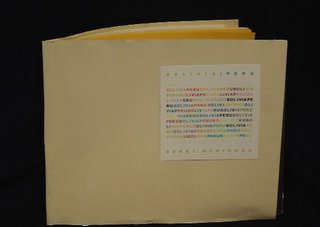Last Call! 1st Annual McKinnon Chapbook Prize
This prize, funded by the UNBC Geoffrey Weller Library Archives, is to acknowledge an outstanding literary chapbook written and published by an emerging local Northern BC writer within the last year (copyright 2005 or 2006). Chapbooks are hand-made books that serve to enhance the reading of the literary text contained in it. The chapbooks will be evaluated on the layout/ construction of the chapbook and the writing within. Judging the chapbooks will be Peter Maides, Peter Ewart, and Rob Budde. Deadline for submissions is Feb 1, 2006. Drop off or send chapbooks to
Rob Budde
English Program
UNBC
3333 University Way
Prince George, BC
V2N 4Z9
The winning chapbook will be announced at the
Barry McKinnon Chapbook Fair & Reading
8:00 pm Tuesday February 7
Art Space (above Books & Co., 1685 3rd Avenue)
Prince George BC
Come celebrate the distinctively Prince George art of chapbook making. The fair will be a chance to show, trade, browse, or sell chapbooks.
Chapbooks are small hand-made books that artistically enhance the literary text. They come out of a tradition of literary “pamphlets” that date back centuries and allowed an author to distribute their work locally to receive critical feedback and spark debate. In the 18th & 19th centuries
“printers sold their chapbooks to itinerant peddlers called 'chapmen', who in turn sold them to consumers. These chapmen, who hawked all manner of small goods for their livelihood, were often roguish figures who lived on the margins of society. [Of course, nowadays there are chap-women as well.] In general, chapbooks were inexpensive publications designed for the poorer literate classes. They were typically printed on a single sheet of low-quality paper, folded to make eight, sixteen, or twenty-four pages, though some examples were longer still.”
For more on chapbooks go here.
Some chapbook presses include book thug, leaf press, mother tongue press, greenboathouse books, above/ground press, belladonna*, nomados, and coach house books.

Tables will be set up and the evening will feature food and readings by local authors, Donna Kane, Ken Belford, Richard Krueger, and the master chapbook maker, Barry McKinnon. The event is sponsored by the Northern BC Archives, Geoffrey R. Weller Library as a formal recognition of McKinnon's archival donations to UNBC .
The winning chapbook will receive a $200 award.
For more information, contact Rob Budde.

1 Comments:
The chapbook as a snippet of time -
once I met a poet (going to the fair) who had just published nine chapbooks. I had just published one. nine chapbooks, shall we call him, wrote out his heartaches and hearticles and put them into booklet form to hawk at his will. why? he didn't say. why? you might ask me about mine, well thank you for asking - because when I was a kid I dressed my dolls in nightgowns and lay them side by side under blankets at the end of the day - because when I was a songwriter I wrote out my troubles and put my therapy to music then sang to a four-track for my future grandkids - but mostly, because I believe in the record of an event and the event is (fill in the blank) my life, my writing, my music, and if it's worth nothing more, it's worth recording for having lived it. that said, I don't expect the world to gobble it up. the chapbook is a useful place for putting the poem to bed.
poetry is self-serving in a number of ways - pleasure of word arrangement on the page, or maybe it's a personal memoir in choppy lines, where you put down your soul to measure for posterity - that and it's poetry: the world is improved by its existence (the world, the poem's record of that existence). the chapbook is self-serving because you made it - to hawk - to parade your greatness. I will buy yours to make note of your record of your event (your life, your poems). I will make note of your having written poetry and then craftily (with a hot glue gun, perhaps?) cut and pasted it into book form without the aid of a publisher apart from yourself. good work. but don't forget that more is not necessarily better. write small books for the small book's sake, one small poem at a time. they add up over time, you know. we all get better over time. chapbook after chapbook after chapbook...
hooray for the chapbook and the poetry mill - hooray for festivities to celebrate the chapbook - hooray for filling up the world with small booklets of handmade paper bound with twine and stamped with sparkles. hooray for the snippets of time inside each book -yours and mine. chapbook away
Post a Comment
<< Home